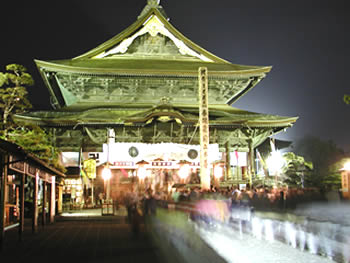I had a public discussion with Yohei Nishimura, who is known for his arts education program for the blind. In addition, Nishimura is a famous ceramic sculptor in his own right. The discussion was a part of the Summer School for tactile art.
I began my discussion by stating how from the point of view of the brain's mechanism lacking the functionality of vision is not a simple case of deprivation. When you take one functionality from the brain, something else fills that space. It is not like "normal" people are on a 100 and blind people are, say, on 10 less. The "normal" and the blind are both on 100, with different compositions of functionalities.
There are worlds open to you only when you become blind. I remember the time when I visited the famous Kaidan-Meguri in Zenko-ji temple. In this ancient temple, you are led into an underground vault, which is totally dark. You cannot see anything, and you try to touch the "key to the paradise" hidden somewhere in the passage. The condition is supposed to symbolize the helpless condition of men before the almighty in this world.
When I was there, I was struck by the surprisingly rich wave of sensations and feelings that arise from walking in the dark, searching and touching with the hand in a hesitating and careful manner. For example, your forehead feels like it is burning, presumably expecting something to hit that part, should some obstacle be in your way. Although the search for the key to the paradise was not easy, I enjoyed the whole process.
When I came out of the pitch-dark vault, I was refreshed by the summer sunshine and wind. I reflected on what I had just experienced, in a totally sightless condition. I pondered on the contrast between inside and outside the vault. Then I suddenly realized that for a blind person there wouldn't have been a single difference. For them, the world would have been a continuous and homogenous condition of sightlessness, and they would not have noticed the transition. I realized what blessings I had as a sighted person, and at the same time appreciated the existence of a whole world that I missed.
Tourist guide to the Zenko-ji temple and other attractions in the vicinity
Zenko-ji temple at night.




